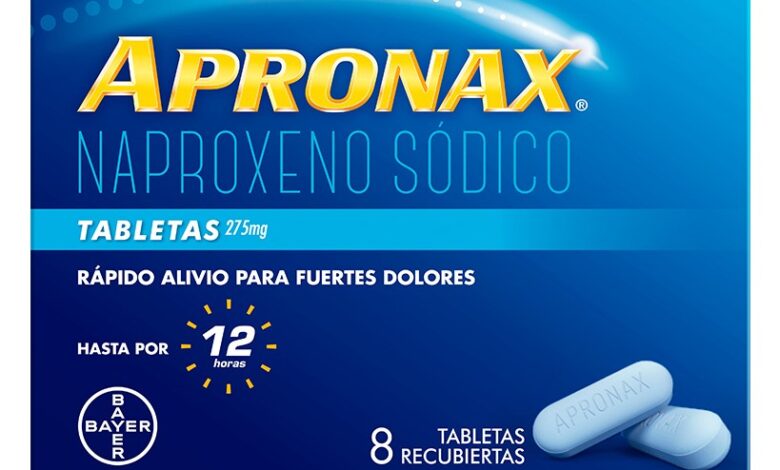Apronax: Side Effects, Dosage, Uses, and Review

What is Apronax, and how does it work (mechanism of action)?
Apronax is a brand of naproxen (Aleve), which belongs to a class of drugs called nonsteroidal anti-inflammatory drugs (NSAIDs). Apronax is used for the management of mild to moderate pain, fever, and inflammation. They work by reducing the levels of prostaglandins, chemicals that are responsible for pain, fever, and inflammation. Naproxen blocks the enzyme that makes prostaglandins (cyclooxygenase), resulting in lower concentrations of prostaglandins. As a consequence, inflammation, pain and fever are reduced. Naproxen was approved by the FDA in December 1991.
Apronax can be obtained over-the-counter (OTC) without a prescription from pharmacies, grocery stores and other retail shops. In the U.S., you may also find naproxen combined with other OTC medicines such as decongestants like pseudoephedrine (Aleve D Sinus and Cold) or sleep aids like diphenhydramine (Aleve PM).
In the U.S., a small bottle of over-the-counter (OTC) naproxen can usually be bought for less than $5.00. Brands names such as Aleve may be more costly. Prescription products, which will require a prescription, may be more expensive or not covered by insurance. Speak with the doctor or pharmacist about how to save money on naproxen products.
What conditions is Apronax used for?
Apronax is used to relieve pain from various conditions such as headache, muscle aches, tendonitis, dental pain, and menstrual cramps. It also reduces pain, swelling, and joint stiffness caused by arthritis, bursitis, and gout attacks. This medication is known as a nonsteroidal anti-inflammatory drug (NSAID). It works by blocking your body’s production of certain natural substances that cause inflammation. If you are treating a chronic condition such as arthritis, ask your doctor about non-drug treatments and/or using other medications to treat your pain. Check the ingredients on the label even if you have used the product before. The manufacturer may have changed the ingredients. Also, products with similar names may contain different ingredients meant for different purposes. Taking the wrong product could harm you.
How to use Anaprox Tablet
If you are taking the over-the-counter product, read all directions on the product package before taking this medication. If your doctor has prescribed this medication, read the Medication Guide provided by your pharmacist before you start taking naproxen and each time you get a refill. If you have any questions, ask your doctor or pharmacist.
Take this medication by mouth as directed by your doctor, usually 2 or 3 times a day with a full glass of water (8 ounces/240 milliliters). Do not lie down for at least 10 minutes after taking this drug. To prevent stomach upset, take this medication with food, milk, or an antacid.
The dosage is based on your medical condition and response to treatment. To reduce your risk of stomach bleeding and other side effects, take this medication at the lowest effective dose for the shortest possible time. Do not increase your dose or take this drug more often than directed by your doctor or the package label. For ongoing conditions such as arthritis, continue taking this medication as directed by your doctor.
For certain conditions (such as arthritis), it may take up to two weeks of taking this drug regularly until you get the full benefit.
If you are taking this drug “as needed” (not on a regular schedule), remember that pain medications work best if they are used as the first signs of pain occur. If you wait until the pain has worsened, the medication may not work as well.
If your condition lasts or gets worse, or if you think you may have a serious medical problem, get medical help right away. If you are using the nonprescription product to treat fever, consult the doctor right away if the fever worsens or lasts more than 3 days.
Can I bring Apronax into the US?
It can be dangerous to purchase foreign medicines online or outside the United States.
Pharmaceutical laws outside the U.S. may not comply with safe-use regulations of the Food and Drug Administration (FDA). Medications purchased in other countries may contain hazardous ingredients, could be counterfeit, or may not be distributed by a legal pharmacy. It may be against the law to bring these products into the U.S. from a foreign country. In some countries, naproxen may only be approved for veterinary use.
According to the FDA, when you come to the U.S. with medications, you fall under the authority of the FDA, the U.S. Customs and Border Protection and the Transportation Security Administration (TSA) agents working in the nation’s airports. There are varying restrictions, and different agencies may have other requirements or jurisdiction over a product. Check with each agency before you plan to travel with medications into the country.
What are the side effects of Apronax?
Common side effects of Apronax may include headache and dizziness. The frequency and severity of side effects that Apronax causes depend on several factors. Considerations include the dose and duration of treatment, other medical diagnoses a person may have, and individual risk factors. The following sections discuss the common and serious side effects of Apronax.
Common side effects
The following table from the Naproxen monograph lists the most common side effects grouped by body system. The side effects in this table occur in approximately 3 to 9 percent of people.
| Body system | Side effect |
| Gastrointestinal tract | Heartburn, constipation, abdominal pain, nausea |
| Central nervous system | Headache, dizziness, drowsiness, depression, fatigue |
| Skin | Itchy skin, ecchymoses, skin eruptions |
| Cardiovascular system | Dyspnea, peripheral edema |
| Senses | Ringing in the ear |
Serious side effects
Although people can buy low-dose Apronax without a prescription, it is not safe for everyone.
People with serious heart conditions, such as heart disease, cerebrovascular disease, and congestive heart failure, may experience severe side effects from taking Apronax.
Severe side effects of Apronax include:
• heart attack
• stroke
• blood clots
People with high blood pressure should only take Apronax cautiously.
Apronax can cause sodium retention in the kidneys, which can result in increased blood pressure. A person with high blood pressure should consult their doctor before taking Apronax.
Gastrointestinal side effects of taking Apronax can be severe. Bleeding in the stomach, the formation of ulcers, and stomach or intestinal blockages can occur when taking Apronax. Most often, older adults are the most vulnerable age group for gastrointestinal side effects.
People who have a history of ulcers or gastrointestinal bleeding have a 10-fold higher risk for developing a bleed when taking Apronax. For these individuals, even short-term treatment can be risky.





